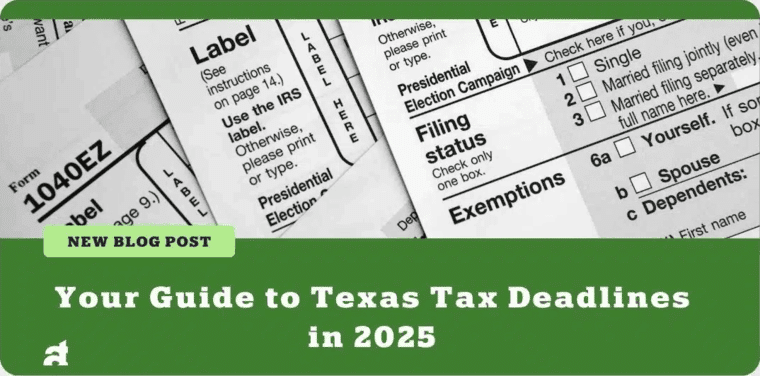
Let’s be honest: we don’t know anyone who likes taxes.
But the consequences of not paying them on time? Penalties, interest, or worse—a dreaded audit.
That’s why it’s worth taking the time to understand what taxes are due, and when.
In this guide, we’ll walk through everything a Texas business owner needs to know: what’s due, who has to file, where to handle it, and what happens if you don’t. You can refer back to this whenever you need to stay informed (or stress-free) when it comes to Texas tax deadlines.
Let’s start with the taxes you’ll pay monthly.
Some taxes in Texas are due every month. Yes, it can feel like a hassle, but it’s better to chip away at these obligations rather than let them pile up.
If you’re selling goods or services in Texas, this one’s for you. As a business owner, you collect sales tax from your customers and send it to the state. Use tax works similarly but applies to goods you purchase from out of state for use in Texas.
Who Needs to Pay: Retailers, service providers, and businesses selling taxable goods or services.
What’s the Deadline: The 20th of each month. If it’s a weekend or holiday, it rolls to the next business day.
How Much: The base rate is 6.25%, but local governments can add up to 2%, meaning some areas charge as much as 8.25%.
How to File: Submit your report and payment through the Texas Comptroller’s website.
If you have employees, you must deposit federal payroll taxes, which include:
Who Needs to Pay: Every business with W-2 employees.
When It’s Due: Your deposit schedule depends on the size of your payroll:
Where to Pay: Use the IRS Electronic Federal Tax Payment System (EFTPS) to make your deposits.
Why It Matters: Missing these deadlines can result in steep penalties and interest charges, so it’s critical to stay on top of your deposit schedule.
Quarterly taxes aren’t as frequent, but they’re just as important. These deadlines cover estimated income taxes and filings like IFTA.
If you’re self-employed or your business doesn’t withhold income taxes for you, you’ll need to make estimated payments throughout the year.
Hint: This isn’t optional!
But it also comes in handy as it spreads out your tax burden and helps you avoid a huge bill at tax time.
When It’s Due:
Who Needs to File: Any freelancer or business owner who expects to owe $1,000 or more in federal income taxes. This includes sole proprietors, partners, S corporation shareholders, and some corporations.
Why It Matters: If you don’t pay enough throughout the year, the IRS can hit you with significant penalties and interest. Even if you’re just a few days late, the penalties start adding up.
Where to File: Use IRS Direct Pay or mail in Form 1040-ES with your payment.
Our Tip: One of the easiest ways to avoid scrambling when taxes are due is to set up a separate bank account just for taxes. Every time your business earns income, transfer 25% of it into this account. That way, when it’s time to pay your estimated taxes, the money is already there, and you’re not left short.
Businesses with employees in Texas must file quarterly unemployment reports and pay unemployment taxes to the Texas Workforce Commission (TWC). These reports detail wages paid to employees and the unemployment tax owed.
When It’s Due:
Who Needs to File: Employers with W-2 employees in Texas.
Why It Matters: Late filings or payments can result in penalties and interest.
Where to File: Reports and payments can be submitted through the TWC’s Unemployment Tax Services portal.
Let’s talk about the annual tax deadlines. These only come around once a year, but that doesn’t make them any less important. Here’s what you need to know to keep things simple and stress-free:
If you’re running a business in Texas, you’re probably familiar with this one. The franchise tax is based on your business’s revenue, and all entities conducting business in the state are required to file.
Deadline: Reports are due every May 15th.
If this date falls on a weekend or holiday, the deadline shifts to the next business day. Extensions are available if requested, but it’s always better to file early and avoid cutting it close.
For 2025, businesses with annualized total revenue of $2,470,000 or less are not required to pay franchise tax. However, even if no tax is owed, you’re still required to file a Public Information Report (PIR) or Ownership Information Report (OIR). Many business owners don’t realize that this report is required even if below the threshold.
Where to File: Reports and payments can be submitted online through the Texas Comptroller’s website.
This applies if you own business property like equipment or inventory. You’ll need to file a rendition that lists your taxable property and its value by April 15th.
If you’re not ready, you can request an automatic extension until May 15th, and further extensions may be granted if there’s good cause.
Property tax rates vary based on the local taxing jurisdiction (county, city, school district, or other special districts).
There’s no flat rate statewide. Instead, it’s based on:
From one business owner to another, we get it. Taxes are not only overwhelming, time-consuming, and confusing, but rushing through them can also lead to costly mistakes.
That’s why we’re here. At Adam Traywick, CPA, we work with you year-round to make sure all of your tax payments are taken care of, strategically planned, and your financial records in perfect order.
By the time we’re done, you’ll see just how much you’ve been overpaying or missing out on all along.
If you’re in the market for a new small business CPA, we’re here to help.
Simply head over to our Contact Page to get in touch. We’ll get back to you within 1 business day.
Until next time!